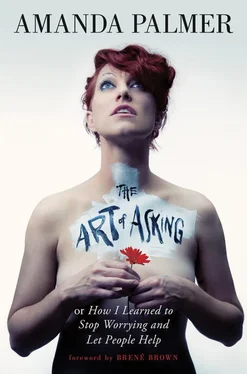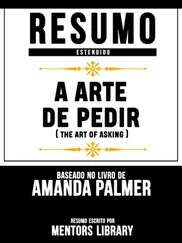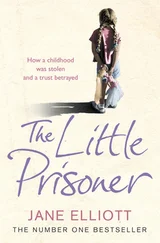But, Amanda… we’reyou’re friends , Alina pointed out, and wethink you’re crazy .
Josh, the tenured philosophy professor, nodded in agreement, then looked at me with his typically furrowed brow.
How long do you think you’ll keep it this way? Forever? Like, you’ll be married for fifty years but you’ll just never mix your incomes?
I didn’t have an answer for that.
• • •
Neil wasn’t the type to attach strings, or play games, but it was my deepest fear that I’d be somehow beholden, indebted to him.
This was a new feeling, this panic, or rather, an old one: I hadn’t felt this freaked out since I was a teenager battling constant existential crises. But now my head was a vortex of questions: How could I possibly take money from Neil? What would people think? Would he hold it over my head? Maybe I should just put this album off another year and tour? What would I do with the band I just hired? What about my staff? How would they deal? Why can’t I just handle this gracefully? Why am I freaking out?
I left the bed after an entire night of tossing and fretting. I went into the bathroom and turned on the light.
What is WRONG with you? I asked the puffy-eyed, snot-leaking, deranged person that was staring back at me from the mirror.
I dunno , she answered. But this is not good . I was scaring myself. What was happening to me? Was I crazy?
It was six a.m., the sun was just beginning to rise, and the sheep were baa-ing mournfully. We had to be awake at eight to drive to the wedding party.
I went back to bed and crawled into Neil’s armpit. He was out cold, and snoring. I looked at him. I loved this man so much. We’d been together for over two years and I’d learned to trust him completely—trust him not to hurt me, not to judge me. But something still felt stuck shut, like a door that should open but just doesn’t budge. I tossed my body to the other side of the bed and tried to sleep, but the cyclone of thoughts didn’t stop. You have to take his help. You can’t take his help. You have to take his help . And then I started to bawl, feeling completely out of control and foolish. I was tired of crying alone, I guess, and ready to talk.
Darling, what’s wrong?
He’s British. He calls me darling .
I… I’m freaking out .
I can see that. Is it the money thing? He put his arms around me.
I don’t know what I’m going to do for these next few months , I snorfled. I think I should put off making the record if I can’t afford to pay everyone right now. I’ll just tour for the next year and forget about the Kickstarter until… I don’t know, I can probably borrow the money from someone else to get through the next few months… maybe I can…
Why someone else? he interrupted quietly. Amanda… we’re married .
So what?
So just get over it and borrow the money from me. Or TAKE the money from me. Why else did we get married? You’d do the same thing for me if I were in an in-between spot. Wouldn’t you?
Of course I would .
So, what is HAPPENING? I’d much rather you let me cover you for a few months than see you in this state, it’s getting disturbing. All you have to do is ASK me. I married you. I love you. I want to HELP. You won’t let me help you .
I’m sorry. This is so weird—I’ve dealt with this shit so many times and it’s never bothered me like this. It’s crazy. I feel crazy. Neil, am I crazy?
You’re not crazy, darling .
He held me. I did feel crazy. I couldn’t rid myself of this one pounding, irritating thought, reverberating through my head like a bitter riddle, an impossible logic puzzle that I just couldn’t shake off or solve.
I was an adult, for Christ’s sake.
Who’d taken money from random people, on the street, for years.
Who openly preached the gospel of crowdfunding, community, help, asking, and random, delightful generosity.
Who could ask any stranger in the world—with a loud, brave laugh—for a tampon.
Why couldn’t I ask my own husband for help?
• • •
We ask each other, daily, for little things: A quarter for the parking meter. An empty chair in a café. A lighter. A lift across town. And we must all, at one point or another, ask for the more difficult things: A promotion. An introduction to a friend. An introduction to a book. A loan. An STD test. A kidney.
If I learned anything from the surprising resonance of my TED talk, it was this:
Everybody struggles with asking.
From what I’ve seen, it isn’t so much the act of asking that paralyzes us—it’s what lies beneath: the fear of being vulnerable, the fear of rejection, the fear of looking needy or weak. The fear of being seen as a burdensome member of the community instead of a productive one.
It points, fundamentally, to our separation from one another.
American culture in particular has instilled in us the bizarre notion that to ask for help amounts to an admission of failure. But some of the most powerful, successful, admired people in the world seem, to me, to have something in common: they ask constantly, creatively, compassionately, and gracefully.
And to be sure: when you ask, there’s always the possibility of a no on the other side of the request. If we don’t allow for that no , we’re not actually asking, we’re either begging or demanding. But it is the fear of the no that keeps so many of our mouths sewn tightly shut.
Often it is our own sense that we are undeserving of help that has immobilized us. Whether it’s in the arts, at work, or in our relationships, we often resist asking not only because we’re afraid of rejection but also because we don’t even think we deserve what we’re asking for. We have to truly believe in the validity of what we’re asking for—which can be incredibly hard work and requires a tightrope walk above the doom-valley of arrogance and entitlement. And even after finding that balance, how we ask, and how we receive the answer—allowing, even embracing, the no —is just as important as finding that feeling of valid-ness.
When you examine the genesis of great works of art, successful start-ups, and revolutionary shifts in politics, you can always trace back a history of monetary and nonmonetary exchange, the hidden patrons and underlying favors. We may love the modern myth of Steve Jobs slaving away in his parents’ garage to create the first Apple computer, but the biopic doesn’t tackle the potentially awkward scene in which—probably over a macrobiotic meatloaf dinner—Steve had to ask his parents for the garage . All we know is that his parents said yes. And now we have iPhones. Every artist and entrepreneur I know has a story of a mentor, teacher, or unsung patron who loaned them money, space, or some kind of strange, ass-saving resource. Whatever it took.
I don’t think I’ve perfected the art of asking, not by a long shot, but I can see now that I’ve been an unknowing apprentice of the art for ages—and what a long, strange trip it’s been.
It started in earnest the day I painted myself white, put on a wedding gown, took a deep breath, and, clutching a fistful of flowers, climbed up onto a milk crate in the middle of Harvard Square.
You may have a memory of when you first, as a child, started connecting the dots of the world. Perhaps outside on a cold-spring-day school field trip, mud on your shoes, mentally straying from the given tasks at hand, as you began to find patterns and connections where you didn’t notice them before. You may remember being excited by your discoveries, and maybe you held them up proudly to the other kids, saying:
Читать дальше












